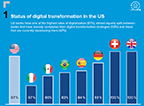NEW YORK--(BUSINESS WIRE)--GFT, the global IT consultancy for the financial services industry, today announced the results of a global survey into retail banking attitudes towards digital transformation. The survey found the main drivers for undergoing digital transformation include meeting customer expectations and reduction in operational costs. 285 retail banking professionals with at least 500 employees globally were surveyed in collaboration with market research firm Frost & Sullivan, between May and September 2017. To view the full report visit www.gft.com/BankingSurvey2017.
Christian Ball, head of retail banking at GFT said, “The trends found in the U.K. are broadly similar to those found in the U.S.. If we look at the U.S. retail banking market as a whole, the customer is very much at the center of most digital transformation projects. Meeting their needs and expectations is paramount. Banks know that they are sitting on a wealth of information, especially unstructured customer data, which is not currently being used to its full capacity. AI solutions such as chatbots, process automation and personalized interfaces, powered by open APIs, are critical to the success of digital transformation projects.”
The results identify the U.S. as among the most advanced markets with 97 percent of banks having completed their digital transformation strategy or are currently developing them. Similar to the results from other geographies, responses in the U.S. indicate that Bank as a Platform (BaaP) – the idea that banks distribute their own products as well as those of third parties through open APIs and front-ends – is considered necessary for shaping the digital bank of the future. However, the study indicates the U.S. lags considerably behind the U.K. and Spain in BaaP strategy. Only 23 percent of banks surveyed (in the U.S.) have a defined and implemented BaaP strategy, while nearly half have not considered it yet.
The study also found that the view of artificial intelligence (AI) in the U.S. – consistent with global results – is essential for the success of digital transformation but is of more tactical than strategic importance. Robotic process automation is among the top AI solutions in terms of implementation advancement. Benefits of AI adoption remain the same as for digital transformation and BaaP, underscoring the importance of greater customer engagement and operational cost reduction as motivators for change.
Ball added, “Challenges such as legacy systems, migration to the cloud, and security and privacy remain top concerns. It’s encouraging to see so many U.S. banks embracing new ways of working and recognizing the increasing importance of these new technologies, but there is still much work to be done. As systems, skills and technologies develop, we’re looking forward to seeing even more examples of successful digital transformation projects in the market.”
Key findings include:
- Despite global variances in banking institutions’ progress in the digital transformation journey, the desire to satisfy customers’ expectations is the #1 driver for improving level of digitalization. In the U.S., the top 3 drivers for digital transformation include: 57% desire to satisfy customers’ expectations; 49% increase revenues from new services/products; and 47% potential for reducing operating costs
- Overall, the vast majority of global respondents (83%) see value in AI, however, the banking market is divided when it comes to just how strategically critical the technology is to their business. In fact, 17% see AI as not being important at all, while the same percentage (17%) view it as a critical strategy
- The main challenges of digital transformation include: 59% stating the integration of legacy system with new technologies is a top challenge, 58% security & privacy implications are top of mind and 51% believe lack of internal expertise and experience are a challenge
About GFT
GFT Technologies SE (GFT) is a business change and technology consultancy trusted by the world’s leading financial services institutions to solve their most critical challenges. Specifically defining answers to the current constant of regulatory change – whilst innovating to meet the demands of the digital revolution. GFT brings together advisory, creative and technology capabilities with innovation culture and specialist knowledge of the finance sector, to transform the clients’ businesses.
Utilising the CODE_n innovation platform, GFT is able to provide international start-ups, technology pioneers and established companies access to a global network, which enables them to tap into the disruptive trends in financial services markets and harness them for their out of the box thinking.
GFT expects to achieve a consolidated revenue of around 415 million euros in the 2017 financial year. Founded in 1987, the company is now represented in eleven countries with a global team of around 5,000 employees. The GFT share is listed on the Frankfurt Stock Exchange in the TecDAX (ISIN: DE0005800601).




